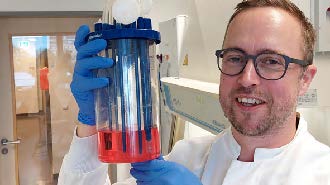Novel immune cell platforms for health research

There is a high demand for immune cell preparations in modern medicine since these can be used to test the efficacy and safety of drugs on human cells. Thanks to a new process developed by an Attract group at the Fraunhofer Institute for Toxicology and Experimental Medicine ITEM, mature human immune cells can now be produced on a large scale for the first time.
Prof. Nico Lachmann is head of the Working Group for Applied Stem Cells and Translational Macrophages Research at the Hannover Medical School (MHH). During his research, he came up with the idea of using a standardized process to produce immune cells for health research from induced pluripotent stem cells (iPSCs). To propel his research from idea to application, he seized the opportunity offered by the “Fraunhofer Attract” program. This funding program provides outstanding scientists from outside of Fraunhofer with the opportunity to bring their marketable ideas to life at a Fraunhofer institute. The “IMMUNITY – designer cells: novel immune cell platforms for health research” project, which Prof. Lachmann started at Fraunhofer ITEM in 2022, has enormous potential for practical application. Human immune cells are used to test and develop new drugs and play an important role in research for new cancer treatments. For example, they can also be genetically modified to detect impurities in drugs – a process that has been very complex and resource-intensive until now. Enriching artificial skin tissue, which is already being used to test cosmetics, with immune cells could improve the reproduction of the reactions of a human organism.
Methods of obtaining human immune cells on a large scale with consistent quality are also in demand. Prof. Lachmann and his team have laid the foundation for this. In their new process, the iPSCs are immersed in a solution in special reaction vessels and agitated so that they continuously produce immune cells such as macrophages. Since the system is designed in 3D – instead of the previous 2D design at the bottom of a petri dish, for example – significantly larger quantities of designer immune cells can be produced, and the scale can be expanded as required. The Attract project aims to advance the development and validation of the system. The focus is also on establishing cell-based potency assays, i.e., test systems for measuring the efficacy and safety of biological and biotechnological drugs.
The Attract team has a budget of 2.5 million euros over five years for further research. “An idea becomes an innovation if it can be turned into a practical application,” says Prof. Lachmann. “The Fraunhofer Attract grant allows me to further develop my ideas with a focus on practical applications, while also being able to draw on the wide range of expertise available within Fraunhofer.”